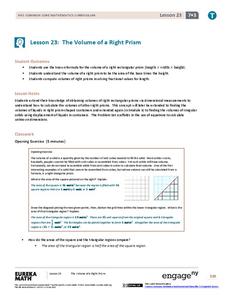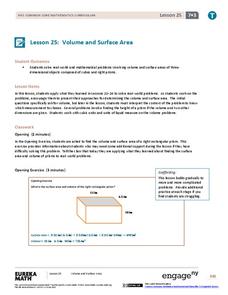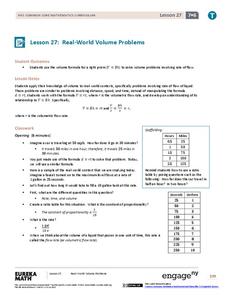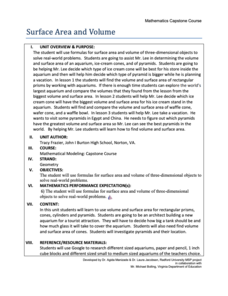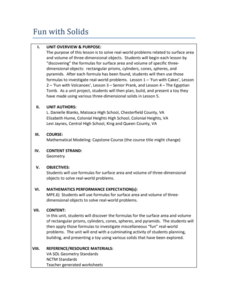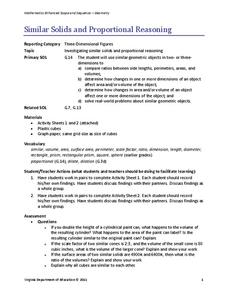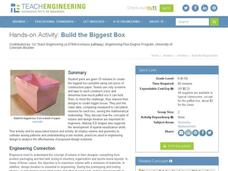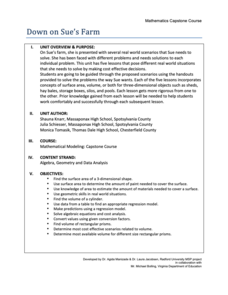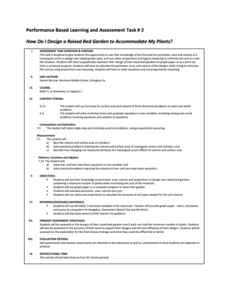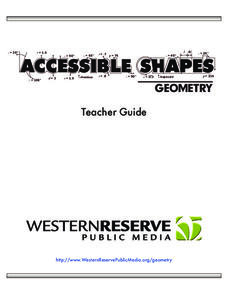Math Drills
Volume and Surface Area of Rectangular Prisms
Your learners get solid practice calculating the surface area and volume of rectangular prisms with this activity. There are ten versions of the activity for their enjoyment, and yours.
EngageNY
The Volume of Prisms and Cylinders and Cavalieri’s Principle
Young mathematicians examine area of different figures with the same cross-sectional lengths and work up to volumes of 3D figures with the same cross-sectional areas. The instruction and the exercises stress that the two...
Virginia Department of Education
Attributes of a Rectangular Prism
A change is coming. Pupils use unit cubes to investigate how changes in the length, width, and/or height affects volume and surface area. They extend the results to write and test predictions on the effect of changing multiple sides on...
Virginia Department of Education
Exploring 3-D Geometry
Take young mathematicians on an exploration of the world of 3-D geometry with this seven-lesson unit. After first defining the terms perimeter, area, and volume and how they apply to the real world, students continue on...
Virginia Department of Education
Surface Area and Volume
Partners use materials to wrap three-dimensional objects to determine the formula for surface area. The groups use an orange to calculate the amount of peel it takes to completely cover the fruit. Using manipulatives, individuals then...
EngageNY
The Volume of a Right Prism II
Discover the difference between the capacity of a container and its volume. The 25th part of a 28-part series presents problems that require pupils to determine the amount of liquid a prism can hold. Learners must take into account the...
EngageNY
The Volume of a Right Prism
Does the volume formula work even if the measurements are not whole numbers? Class members work simple problems to find that the formula (area of the base) × (height) works for all prisms, independent of measurements and shape.
EngageNY
Volume and Surface Area
The 26th part of a 28-part series requires pupils to determine whether the answer to a problem requires surface area or volume. The class works problems about fish tanks that prompt individuals to decide, based on the question, which...
EngageNY
Volume of Composite Three-Dimensional Objects
Most objects have irregular dimensions — you have to find them! Teach your class how to find the volume of composite objects that can be decomposed into prisms. Objects get increasingly more complex as the lesson progresses.
EngageNY
Volume of Right Prisms
Apply volume and area formulas to find the volume of any right prism. The 26th lesson of a 29-part module examines methods for finding the volume of right prisms with varying shapes of bases. Learners use the formula V = Bh to find...
EngageNY
Volume and Surface Area II
Determine the cost of projects based on volume or surface area. Pupils work problems to determine the cost of building a brick planter and a stainless steel feeder in the 27th installment of a 28-part series. Participants must consider...
EngageNY
Real-World Volume Problems
How long does it take to fill a typical swimming pool? Prepare your pupils to answer similar questions using the 28th lesson in the 29-part module. The engaging lesson asks individuals to solve problems connected to the flow rate. All...
Radford University
Surface Area and Volume
Who knew there were pyramids in China? Learners apply surface area and volume formulas to several different real-world situations. They calculate the volume and surface area of an aquarium, an ice cream cone, and Egyptian and Chinese...
Radford University
Fun with Solids
Cakes offer a yummy way to learn about math. Scholars use manipulatives to discover the formulas for the surface area and volume of prisms and cylinders. They use their formulas to calculate the amount of cake mix and frosting necessary...
Virginia Department of Education
Similar Solids and Proportional Reasoning
Double the dimensions, quadruple the surface area. Pairs build similar prisms and compare the ratios of their surface areas and volumes to the ratio of the heights. Given two similar cones, partners determine the ratios of the lateral...
101 Questions
Building Boxes
Build foundational knowledge of volume by building boxes. Given dimensions for a piece of grid paper, young mathematicians determine the number of possible open-top boxes it will make. As part of this task, they also find the box with...
Teach Engineering
Build the Biggest Box
Boxing takes on a whole new meaning! The second installment of the three-part series has groups create lidless boxes from construction paper that can hold the most rice. After testing out their constructions, they build a new box....
Digital Lesson
Cereal Box Surface Area
How much math can your learners pour out of a cereal box? Your middle schoolers will explore their favorite cereal and calculate the surface area, volume, and weight ratios and log this information on the provided worksheet. They get to...
Radford University
Building Sandcastles
Finalize the plans before playing in the sand. Learners design sandcastles using geometric and composite figures. They create blueprints, including the scale, and three-dimensional models of their castles. Finally, scholars calculate the...
Radford University
Down on Sue's Farm
When would a farmer use math? Class members work through five tasks on a farm that require knowledge of surface area, volume, and determining regression equations. The challenges range from figuring out the amount of paint to buy,...
Radford University
Fun with Solids
Geometry is all around us—if we're only willing to look. The final three activities of the Fun with Solids unit continue work on surface area and volume. For lesson three, scholars investigate the formulas for spheres and solve a problem...
Radford University
How Do I Design a Raised Bed Garden to Accommodate My Plants?
Give plants the best place to grow. Given constraints on plant spacing, pupils design a raised bed garden using graph paper, then calculate the perimeter, surface area, and volume. They use the provided costs of lumber and soil to...
PBS
Accessible Shapes
All the 2-D and 3-D measurement work you need is in one location. Divided into three sections, the geometry lesson plans consist of visualization of three dimensions, classifying geometric figures, and finding surface area and volume....
Teach Engineering
Determining Densities
Don't be dense—use a robust resource. The second installment of a five-part Floaters and Sinkers unit has learners determine the densities of several objects. As part of the activity, they learn the displacement method for finding...






